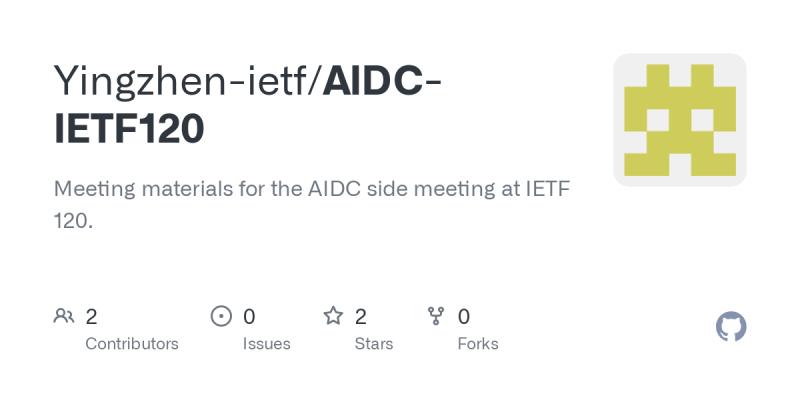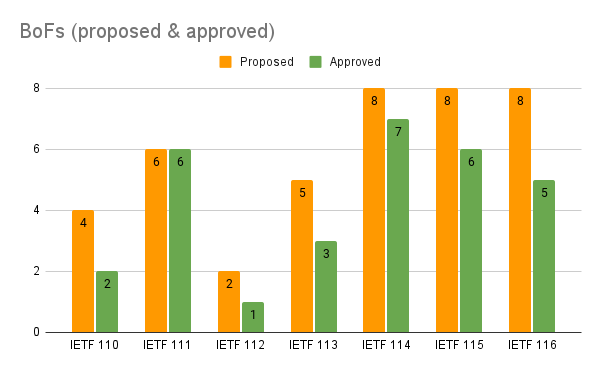The Internet Engineering Task Force (IETF) 120 conference offers a plethora of sessions that are worth exploring for anyone interested in delving into fresh and innovative topics in the field of Internet technologies. Among these, the “Emerging Networking Technologies” session is highly recommended, as it provides insights into the latest advancements and innovations in networking technologies, including but not limited to, cutting-edge wireless communication, network architecture, and network function virtualization. Another session, the “Internet of Things (IoT) Security and Privacy” is essential for understanding the current challenges and future trends in IoT security and privacy.
This session highlights the importance of securing IoT devices and networks, especially given their increasing prevalence in our daily lives. The “Next-Generation Internet Protocol” session explores the development and application of advanced Internet protocols, providing a comprehensive overview of the latest trends and innovations in this realm.
For those interested in the relationship between technology and society, the “Internet Governance and Regulation” session presents a nuanced discussion about the complex interplay between these two domains, without delving into legality or morality. Lastly, the “Artificial Intelligence in Networking” session is a must-see for anyone interested in the intersection of AI and networking, focusing on the latest uses of AI in managing and securing networks. These sessions are just a glimpse of what the IETF 120 conference has to offer, and they are sure to provide valuable insights into the latest trends and innovations in the field of Internet technologies.
![]()
Highlights of Emerging Technologies at IETF 120
IETF 120, the Internet Engineering Task Force’s latest meeting, showcased a myriad of emerging technologies that are set to redefine the landscape of global internet infrastructure. Blockchain technology, for instance, was one of the main highlights. It was discussed at length, considering its potential applications in enhancing network security by providing a decentralized method of data storage and transfer. Another prominent feature was the rise of Artificial Intelligence and Machine Learning.
These technologies are being integrated into network operations to improve efficiency and speed, with a focus on predictive analytics and automation. The introduction of quantum computing also sparked interesting discussions. This innovative technology holds the potential to revolutionize data processing speeds and encryption methods, which could vastly enhance Internet services and security. The Internet of Things (IoT) was also a major theme, with discussions about its development and implementation to connect everyday devices for seamless data exchange and communication.
The future of 5G technology was also on the agenda, with its potential role in the next generation of Internet services being explored. The focus was on its faster speeds, higher capacity, and lower latency, which could drive significant changes in how we interact with the Internet. Finally, the emergence of edge computing was another significant highlight.
This technology aims to bring computation and data storage closer to the location where it’s needed, reducing latency and improving responsiveness. All these emerging technologies, showcased at the IETF 120, promise to bring transformative changes to the Internet, making it more secure, efficient and user-friendly.

Key Sessions for Understanding Future Protocols
Key sessions for understanding future protocols are essential platforms where information about forthcoming guidelines, rules, and standards are disseminated. These sessions are crucial in various sectors, including technology, business, health, and education, as they help anticipate the change and prepare for it ahead of time. They are typically led by experts who have a deep understanding of the subject matter and can provide detailed insights into the expected changes and how they will affect the current systems.
In the world of technology, for instance, these sessions may provide insights into the upcoming protocols in cybersecurity, data privacy, or artificial intelligence, thereby helping businesses and individuals prepare for these changes. Similarly, in the health sector, they could highlight the future protocols for clinical trials, patient data management, or pandemic response, ensuring that healthcare providers stay updated and ready for implementation once these protocols are in effect.
Key sessions for understanding future protocols are not just about learning new rules but also about understanding their impact and implications. They facilitate a comprehensive understanding of the rationale behind these protocols, the challenges they aim to address, their potential benefits, and any potential drawbacks. Moreover, these sessions provide a platform for dialogue and discussion, enabling stakeholders to voice their concerns, seek clarifications, and contribute their perspectives, thus fostering a more inclusive and informed approach to protocol development and implementation.
In essence, these sessions serve as a bridge between the present and the future, guiding the transition by equipping people with the knowledge and understanding they need to navigate the forthcoming changes. They are vital in ensuring a smooth transition, minimizing disruptions, and maximizing the benefits of new protocols. Therefore, individuals and organizations should prioritize participating in these sessions to stay ahead of the curve and be better prepared for the future.
Key Sessions for Understanding Future Protocols
The concept of future protocols is continually evolving, particularly in an age of rapid technological advancement. Therefore, key sessions aimed at understanding these protocols are imperative. These sessions provide a foundation for professionals across different sectors to grasp the intricacies of future protocols, enabling them to stay ahead of the game. They encompass a wide range of topics such as the development of digital ethics, the implications of artificial intelligence, the use of blockchain technology, cybersecurity, data privacy, and much more.
These sessions often take the form of workshops, seminars, webinars, or even comprehensive courses, facilitated by industry-leading experts. They aim to equip attendees with the necessary knowledge and skills to navigate the complexities of future protocols effectively. These sessions often explore the potential impact of these protocols on businesses, governments, and society as a whole. They delve into the intricate relationship between technology, social norms, and the ethical considerations that shape these protocols.
For instance, a session on blockchain technology might discuss its decentralized and immutable nature, the potential for smart contracts, and the role of cryptocurrencies. A seminar on cybersecurity might cover the various threats, defenses, and strategies for protection in an increasingly interconnected world. A webinar on artificial intelligence could explore the implications of machine learning, automation, and the singularity.
Moreover, these sessions are not just theoretical lessons; they often involve practical components as well. Attendees might have the opportunity to work on case studies, simulations, or even real-world projects that allow them to apply what they’ve learned and gain hands-on experience.
In conclusion, key sessions for understanding future protocols are a valuable tool for professionals seeking to stay informed and prepared in the ever-evolving technological landscape. They offer both theoretical knowledge and practical experiences, ensuring attendees are well-equipped to handle the challenges and opportunities presented by future protocols.

Top Workshops for Diving into Cutting-Edge Topics
In the rapidly evolving world, it’s crucial to stay on top of the latest advancements and trends. This is particularly true in the fields of technology, science, and business. As a result, various workshops have emerged, offering the opportunity to dive deep into cutting-edge topics. Among these, several workshops stand out due to their innovative content and exceptional teaching methods.
The Massachusetts Institute of Technology (MIT) regularly hosts workshops on artificial intelligence and machine learning. These workshops provide a thorough understanding of these complex subjects and their application in various sectors. Similarly, the Stanford University’s Design School offers workshops on design thinking, a problem-solving approach that promotes innovation and creativity.
For those interested in health and science, the Harvard Medical School organizes workshops on genomics and personalized medicine. Participants learn about the latest developments in genetic research and their implications for medical treatment.
In the business domain, the Wharton School of the University of Pennsylvania conducts workshops on digital marketing strategies and business analytics. These workshops equip participants with the skills needed to thrive in the digital age.
For technology enthusiasts, the California Institute of Technology (Caltech) offers workshops on quantum computing and nanotechnology. These workshops delve into these cutting-edge technologies, explaining their potential impact on society.
Furthermore, workshops on renewable energy and sustainable development are hosted by the Massachusetts Institute of Technology (MIT) and Stanford University. These workshops address the urgent need for sustainable solutions to global environmental challenges.
Workshops are also available online, making them accessible to a global audience. Platforms like Coursera, Udemy, and edX offer a wide range of workshops on various topics, from cybersecurity to data science.
In conclusion, these workshops provide a unique opportunity to delve deep into the most innovative and relevant topics of our time, equipping participants with knowledge and skills that are in high demand. Whether you’re a professional seeking to expand your skill set or a student exploring future career paths, these workshops can help you stay ahead of the curve.

Essential IETF 120 Panels for Staying Ahead in Technology
The International Engineering Task Force (IETF) 120 panels are critical resources for anyone seeking to stay at the forefront of technological advancements. They offer insightful discussions, presentations, and workshops on a broad range of topics, from cybersecurity and data privacy to Internet architecture and the latest networking technologies.
One essential panel is the ‘Internet of Things (IoT)’ panel, where current and future trends in IoT technology are explored, providing a comprehensive understanding of the challenges and opportunities in this rapidly growing field. Another noteworthy panel is ‘Artificial Intelligence and Machine Learning’, which delves into the intricacies of AI/ML technologies, their practical applications, and the ethical considerations surrounding their use. Furthermore, the ‘5G and Beyond’ panel provides an in-depth look at the newest generation of mobile networks, its capabilities, and its impact on various industries.
The ‘Blockchain and Distributed Ledger Technologies’ panel is also crucial, revealing the groundbreaking potential of these technologies beyond cryptocurrency. Lastly, the ‘Cybersecurity and Privacy’ panel is indispensable, discussing the evolving threat landscape and the innovative solutions to safeguard digital assets and user data.
All these panels, among others, are packed with the knowledge of industry experts, thought leaders, and innovators, making them invaluable resources for anyone aspiring to stay ahead in the ever-evolving world of technology. Attending these IETF 120 panels can therefore equip individuals and businesses with the most up-to-date technological insights, helping them to navigate and excel in the digital landscape.
